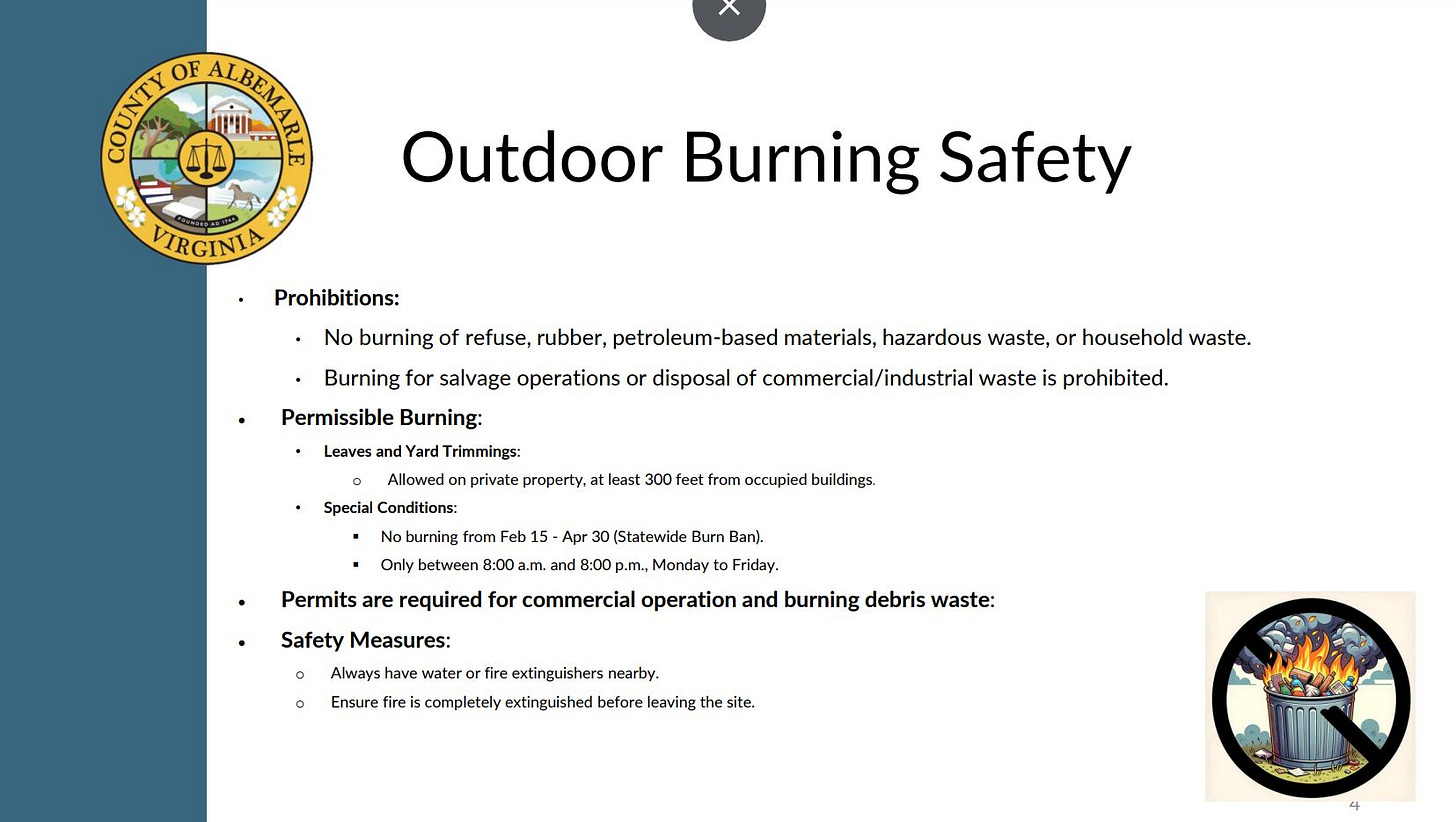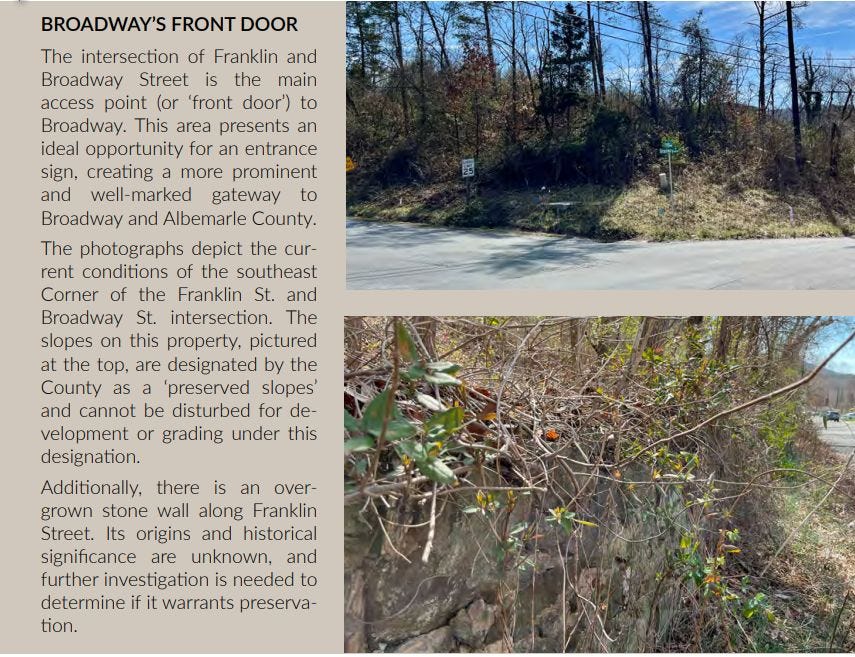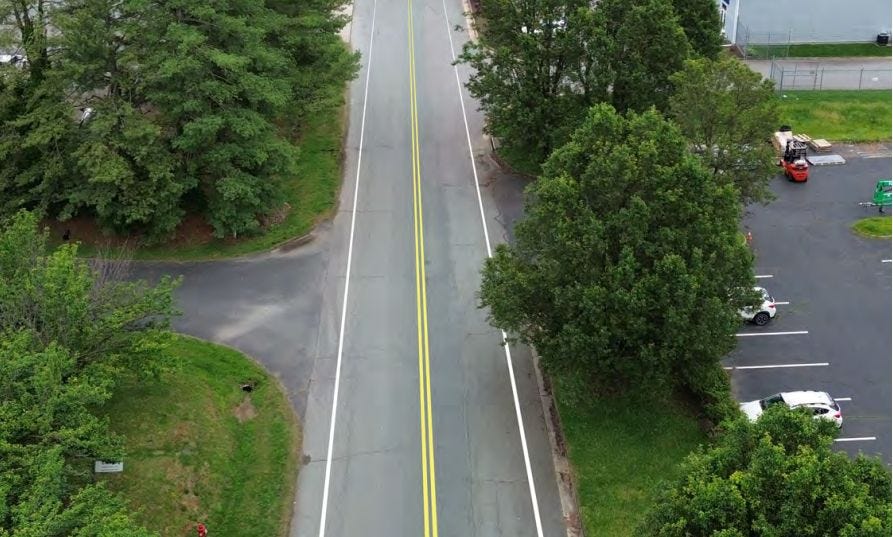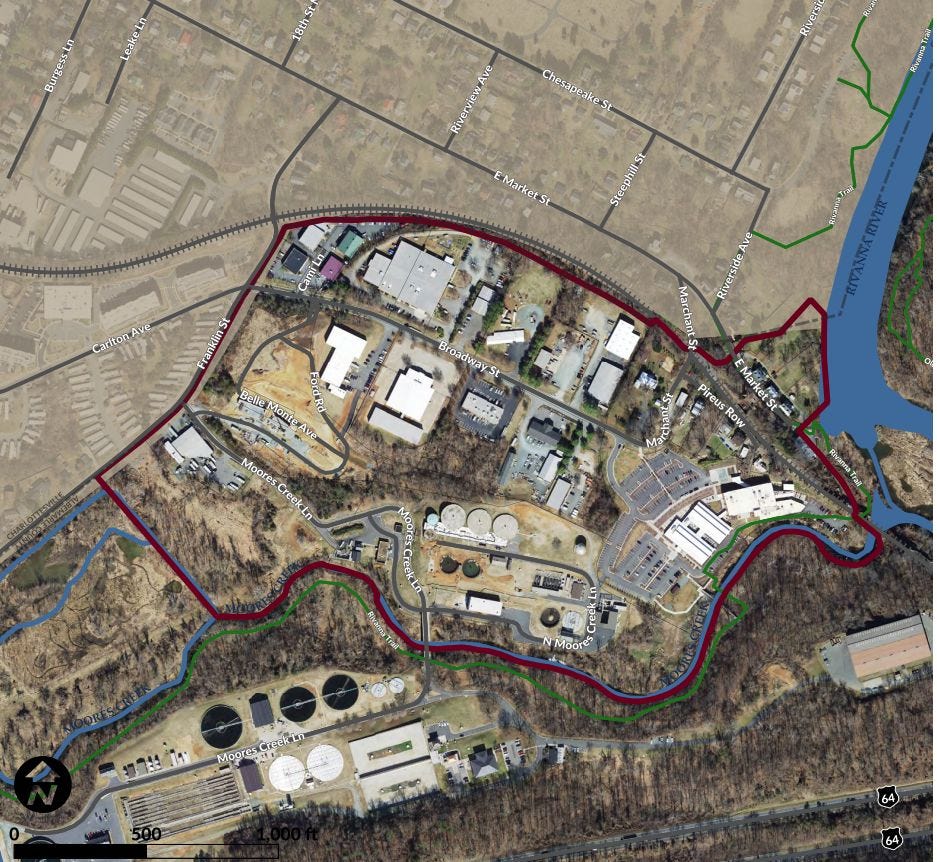June 14, 2024: Albemarle Supervisors seek to keep Broadway area reserved for light industrial
Plus: Two area filmmakers are now fellows in Preservation Virginia's Voices Remembered series
When I was younger, June 14 seemed to have more resonance as Flag Day. On this day In 1777, the Second Continental Congress approved the basic design of what we know as the American flag. Two years before, they approved an army. Now we’re two years away from the 250th anniversary of 1776 and there are still so many stories left to be told, flags or not. I’m Sean Tubbs, and Charlottesville Community Engagement is set up to try to tell some of them.
In today’s installment:
Albemarle Fire Rescue’s community risk and resilience division seeks to reduce fires
Preservation Virginia has selected five fellows for their Voices Remembered series to preserve Black historic sites
Albemarle officials are briefed on the next phase of a plan to make the Broadway area more attractive to industrial uses
First -shout out: Charlottesville E-bike Lending Library
In today’s first Patreon-fueled shout-out: The rolling topography of the Charlottesville area keeps some people away from choosing cycling as an option to get around. Perhaps an e-bike is in order?
That’s where Charlottesville’s eBike Lending Library comes in! E-bikes are a great way to get around the community but there are many brands and styles to choose from. Because many e-bikes are sold online, it can be a challenge to try an e-bike before buying one.
The Charlottesville E-bike Lending Library is a free, not-for-profit service working to expand access to e-bikes in the area. They have a small collection of e-bikes that they lend out to community members for up to a week, for free. You can experience your daily commute, go grocery shopping, or even bike your kids to school, and decide whether e-bikes are right for you. Check out this service at https://www.ebikelibrarycville.org!
Albemarle Fire Department: prevent fires by switching out mulch landscaping for rocks
One of the purposes of Albemarle County’s Community Advisory Committees (CAC) is to provide a forum for public officials to interact with the public.
Albemarle Fire Rescue Chief Dan Eggleston attended this week’s meeting of the Places29-Hydraulic CAC to present tips on how to avoid fires this summer.
“Because we’ve had a number of fires in the community and some concerns around safety, I asked Dan to come and make a presentation,” reported Jack Jouett Supervisor Diantha McKeel at this week’s meeting of the Board of Supervisors.
Eggleston’s presentation covered outdoor burning safety, grilling safety, and emergency preparedness.
McKeel said one concern that came up during the meeting is the possibility of mulch fires started when people throw lit cigarettes out of their window.
“And of course they’re flicked onto mulch beds at businesses along the roads and they start fires which the fire department has to respond to,” McKeel said. “Dan said they are being proactive right now in areas like Pantops and a few other areas where there are businesses along the roads and they have mulch beds and plantings and they’re reaching out and asking whether the business owners would switch out the mulch beds to rock.”
Abbey Stumpf, Albemarle’s director of communications and public engagement, said there’s no official program but that is an area the Community Risk and Resilience Division has worked on.

Two area filmmakers selected for Preservation Virginia program
The group Preservation Virginia works all over the Commonwealth to help commemorate and conserve previous places where people have lived. One of their initiatives is called Voices Remembered and seeks to tell the stories of Black Virginians.
To that end, Preservation Virginia has named five African American fellows who will each receive $10,000.
“Planning for the fellows program began in 2021 through the guidance of an advisory committee of Black leaders to increase the number of trained community preservationists helping save African American historic sites in Virginia,” reads a press release.
Two of those chosen are doing work in this area of Virginia.
Lorenzo Dickerson is an Albemarle County filmmaker who has produced several works including Raised / Razed which documents the destruction of the Vinegar Hill neighborhood in the mid-20th Century. His first film from 2014 is called The Coachmen and documents the life of his second great-grandfather. Take a look at his work at his site Maupintown Media.
“Mr. Dickerson's project as a part of the Preservation Virginia African American Fellowship is an oral history and short documentary-style film that tells the story of the St. John Elementary School in Cobham, Virginia, which opened in 1922 to replace the previous school building and provide a better learning space for African American students,” reads the press release.
Horace Scruggs is a filmmaker in Palmyra who will use his fellowship to map historic sites across Fluvanna County. After he retired from public education in 2020, Scruggs began making documentaries including “Resilience, Recovery, and Rebirth: Sustaining Hope in Trying Times” (2021), “Reconstructed: The Rebuilding of African-American Communities Through Faith and Education” (2022) “Reclaiming the River” (2022), “Traveling Our Ancestors’ Journey: A Descendants’ Reunion” (2023).
The other awardees are:
James Harrison, a geologist in Surry who is researching Black American land ownership on Gray’s Creek between 1860 and 1960
Michael Johnson, a cemetery preservationist in Alexandria focused on preserving the Frederick Douglass Memorial Cemetery which has many missing headstones
Michelle Evans-Oliver, a genealogist in Richmond focused on preserving the Evergreen Cemetery in Richmond
Visit the press release to learn more about the work of all five fellows.
Second shout-out: Camp Albemarle
Today’s second subscriber-supported public service announcement goes out to Camp Albemarle, which has for over sixty years been a “wholesome rural, rustic and restful site for youth activities, church groups, civic events and occasional private programs.”
Located on 14 acres on the banks of the Moorman’s River near Free Union, Camp Albemarle continues as a legacy of being a Civilian Conservation Corps project that sought to promote the importance of rural activities. Are you looking to escape and reconnect with nature? Consider holding an event where the natural beauty of the grounds will provide a venue to suit your needs. Visit their website to view the gallery and learn more!
Albemarle Supervisors: Broadway area should remain available for industrial use
There are many geographical quirks in our community, such as a small sliver of northern Albemarle County that’s within Virginia’s 7th Congressional District.
A much larger portion of Albemarle is on the western banks of the Rivanna River, a natural border with the City of Charlottesville. Staff in both the county’s economic development office and community development department are putting the finishing touches on a second phase of something called the Broadway Blueprint.
“We’re southeast of the City of Charlottesville and just near the confluence of the Rivanna River and Moores Creek,” said Rachel Falkenstein, a consultant with the firm 3TP Ventures. “Broadway Street bisects our study area and it is about 62 acres total.”
The first phase of the Broadway Blueprint took a broad overview at the area and laid out a series of general concepts for what could happen in the space. 3TP Ventures is one of two firms hired to conduct a second review of potential implementation steps. Line and Grade is the other firm. (read the draft report)
Albemarle Economic Development began taking a look at the area around the time that developer Brian Roy was planning to redevelop the long-abandoned Woolen Mill factory as a new commercial space with office, retail, and restaurant space.
The first phase was completed in 2020.
“We wanted to kind of take work and build open it and we have three parts to our work,” Falkenstein said. “We did a kickoff where it was just more kind of listening and information gathering. And then there was a mid-point review and that was when we were last before you all back in February where we had some observations we had identified.”
Wednesday’s discussion was to get the final input before the document comes back for an adoption. In February, Supervisors told staff they wanted to prioritize industrial land uses in the area and to discourage large-scale residential use out of a concern there would be conflict between the two uses.
“We brought up the concept of an arts and cultural district with you all at that time and we heard support for that and supporting the artisans in the area and the art studio space that is there,” Falkenstein said. “We heard some support for recommendations to improve Broadway for pedestrian and bicycle facilities but you also highlighted the importance of coordinating with the City of Charlottesville.”
Falkenstein reminded Supervisors that Broadway is landlocked.
As with any plan, there are several recommendations in the form of strategies that call for further action. These include changes to the Comprehensive Plan, perhaps to create an “Employment District” to call for more industrial infill land. Another idea would be to work with landowners on Marchant Street and Pireus Row to alter the zoning to protect the historic structures for infill residential development.
“So in your Comprehensive Plan, these parcels are identified for residential in the future but your current zoning is for industrial, light-industrial zoning,” Falkenstein said.
Another strategy is to take a fresh look at the side of Franklin Street that is within Albemarle County to ensure uses are compatible with the Charlottesville side. At issue is the designation of some hillsides on the Albemarle side as “preserved slopes” that would need to be altered if there were to be changes.

Other ideas in the plan include:
Engage with artists to create a wayfinding plan for the area to create an identity for the area
Consider converting Marchant Street to a private roadway to clarify the future and potentially find a way to officially align the Rivanna Trail through this area
Work with property owners on East Market Street in both Albemarle and Charlottesville to install bike and pedestrian improvements. This would include purchasing right of way.
Continue work toward a pedestrian bridge to cross the Rivanna River. There is an active project seeking funding that saw a large cost increase in 2022. Albemarle is seeking additional federal funding for additional engineering work which could reduce the cost estimate (look up on cvillepedia)
Painting lines on Broadway to define lanes, shoulders, and walkways. The latter item could include a new VDOT standard of a “walking shoulder” that Hyer say is in the works.
That last item may happen sooner than later as the work that went into the study built off planning the Albemarle County Service Authority is doing for a waterline replacement on Broadway.
“We were able to use the resources they had aggregated and procured for their project for our work,” said Dan Hyer of the firm Line and Grade, the second consultant working on the plan. “As part of their project we learned that they were going to completely mill and resurface Broadway Street when they were finished with the waterline replacement.”
That means there’s time to coordinate a way to mark the road to bring it up to standards in a cost-effective way. Hyer said bid documents to do the work will be issued this summer.
Hyer also made a pitch for connecting the area to public transit. Charlottesville Area Transit Route 3 currently comes close but there’s quite a gap from Carlton Road to Broadway.
“This really is paying attention to how things change over time but making sure that we’re coordinating opportunities for transit between Broadway and Downtown Charlottesville whether that’s microtransit or Jaunt or some other type of mechanism,” Hyer said.
Supervisors had generally positive reactions to the strategies but were resistant to anything that would put multifamily apartments in the place. White Hall Supervisor Ann Mallek reminded the Board much of Hollymead was originally zoned industrial but changed in the late 2000’s.
“We lost massive acreage for light industrial because people complained and said ‘oh, I don’t have anyone who wants to be here so I want to put up apartments’ and bang, there goes 100 acres right there,” Mallek said.
Mallek said one way to protect the historic structures would be for Albemarle to adopt a historic protection ordinance.
Supervisor Ned Gallaway who encouraged a priority be put on creating the arts and cultural district to help the area become more vibrant.
“I think that activity ultimately is what encourages or pushes the dominos for pedestrian infrastructure, block parties, and things like that,” Gallaway said.
Supervisor Mike Pruitt said he was concerned too much organization to promote such a district may affect the conditions that allowed some of the art spaces to set up in the Broadway area.
“My worry might be that the creation of some kind of business or tax incentive through the district would not necessarily benefit the Visible Records of the world first and foremost who are already able to survive in this location, but it might instead create an interesting value proposition for the investor,” Pruitt said.
Supervisor Diantha McKeel was also concerned that too much attention to the area might have too much of an effect. She cautioned against unintended consequences.
“If this area turns into music events, breweries, all these cultural events, while they’re wonderful, I worry about the light industrial piece of this,” McKeel said. “This is the only place for some folks in this community to have a business and there’s a tension there.”
The project will come back to Supervisors for final adoption later this year, most likely on a consent agenda.

Third shout-out: Light House Studio seeks a Teaching Specialist
Today we experiment with a third shout-out: One paid subscriber has this request:
“I wanted to let you know that we're hiring a Teaching Specialist at Light House Studio! I'd be grateful if you would share with anyone who might be intersted. Job details can be found at https://lighthousestudio.org/careers.
Reading material:
Fluvanna County earns tourism and economic development designation, CBS19 News, June 4, 2024
Change order: UVA’s Building and Grounds meets this week to approve Center of Arts, new parking garage, Sean Tubbs, C-Ville Weekly, June 5, 2024
Supervisors approve funding for sewer and septic project at Southwood, CBS19 News, June 6, 2024
Supervisors Approve Tax Rates, Budget, Lisa Martin, Crozet Gazette, June 7, 2024
Ben Hurt’s Name Removed from County School, Lisa Martin, Crozet Gazette, June 7, 2024
Another Step Closer: New Arts Center, Shannon Court at the Rotunda, Matt Kelly, UVA Today, June 7, 2024
Not-so-tiny change: Louisa County removes definition of “tiny home,” allows for construction, Sean Tubbs, C-Ville Weekly, June 12, 2024
In Memoriam: UVA Storyteller, Dignitary Sandy Gilliam ‘Will Be Greatly Missed’, Matt Kelly, UVA Today, June 12, 2024
The JRC Podcasters Return, Nancy Gill, The James Exchange, June 13, 2024
Morning is #689
Are three segments enough for this newsletter? Well, this edition gets three segments, even though a fourth is underway. I’ll just move that on to Monday morning which will be the next time there will be an edition that’s like this.
Tomorrow there will be a podcast version. Possibly two of them! I still need to record the audio version of the Champaign-Urbana story.
On Sunday there will be a Week Ahead, the 267th edition of an attempt to let people know what’s coming up at local meetings.
Between now and then I’ll write a story for C-Ville Weekly, which is not technically part of my work but it’s certainly related. The same research goes into it all.
I’m grateful I can do this because of paid subscribers. This summer will hopefully see morning editions become routine, which will hopefully boost the audience. Growth has been steady for four years, and what will the next four be? Will this continue?
If you’d like to help make it continue, please do consider a paid subscription through Substack.
Ting will match your initial subscription, whether it be at $5 a month, $50 a year, or $200 a year. It is quite generous of them to do so, and I appreciate their investment in this style of community journalism.
Ting can help you with your high speed Internet needs. If service is available in your area and you sign up for service, enter the promo code COMMUNITY and you will get:
Free installation
A second month for free
A $75 gift card to the Downtown Mall








